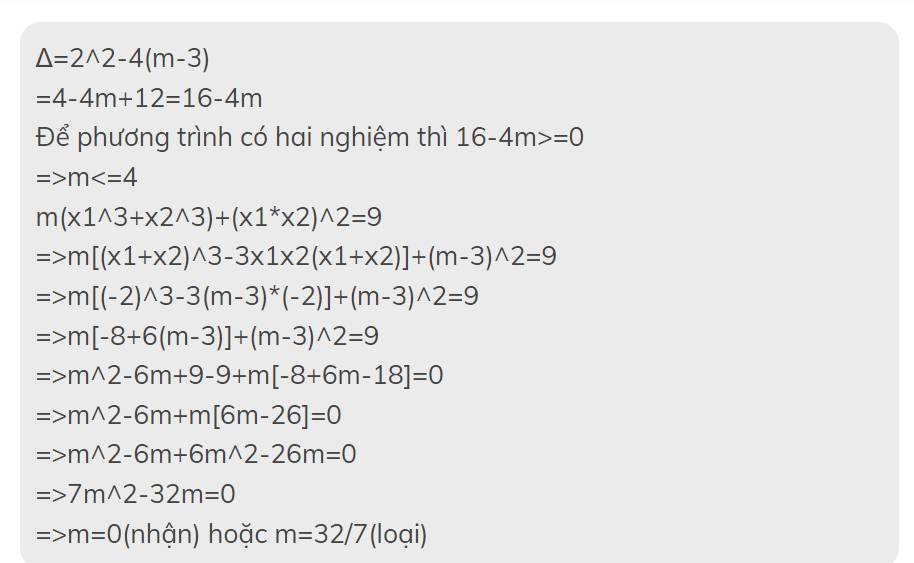Hãy nhập câu hỏi của bạn vào đây, nếu là tài khoản VIP, bạn sẽ được ưu tiên trả lời.

Δ=2^2-4(m-3)
=4-4m+12=16-4m
Để phương trình có hai nghiệm thì 16-4m>=0
=>m<=4
m(x1^3+x2^3)+(x1*x2)^2=9
=>m[(x1+x2)^3-3x1x2(x1+x2)]+(m-3)^2=9
=>m[(-2)^3-3(m-3)*(-2)]+(m-3)^2=9
=>m[-8+6(m-3)]+(m-3)^2=9
=>m^2-6m+9-9+m[-8+6m-18]=0
=>m^2-6m+m[6m-26]=0
=>m^2-6m+6m^2-26m=0
=>7m^2-32m=0
=>m=0(nhận) hoặc m=32/7(loại)
△ = 4-4m+12 = 16-4m
ptr có 2 ngh \(x_1;x_2\) ⇔△≥0 ⇔m≤4
Theo viet: \(x_1+x_2=-2;x_1x_2=m-3\)
Ta có\(m\left(x_1^3+x_2^3\right)+x_1^2x_2^2=9\\ \Leftrightarrow m\left(x_1+x_2\right)\left(x_1^2+x_2^2-x_1x_2\right)+x_1^2x_2^2=9\\ \Leftrightarrow m\left(-2\right)\left(x_1+x_2\right)^2-3x_1x_2m\left(-2\right)+\left(x_1x_2\right)^2=9\\ \Leftrightarrow-8m+6m\left(m-3\right)+\left(m-3\right)^2=9\\ \Leftrightarrow6m^2-18m-8m+m^2-6m+9=9\Leftrightarrow7m^2-32m=0\\ \)
⇔m=0(tm) hoặc m=32/7 (loại)
kl....

△'=(-2)2-1(m-1)
=4-m+1
=5-m
Để PT có 2 no pb thì △'>0
⇒5-m>0
⇒m<5
theo vi-ét ta có
\(\left\{{}\begin{matrix}x_1+x_2=4\\x_1x_2=m-1\end{matrix}\right.\)
mà: \(x^2_1x_2+x_1x_2^2-2\left(x_1+x_2\right)=0\)
⇔\(\left(x_1x_2\right)\left(x_1+x_2\right)-2\left(x_1+x_2\right)=0\)
⇔\(\left(m-1\right)4-2\cdot4=0\)
⇔\(4m-4-8=0\)
⇔4m-12=0
⇔4m=12
⇔m=3
Vậy ...

Lời giải:
Để pt có 2 nghiệm phân biệt thì:
$\Delta'=m^2-(2m-4)=m^2-2m+4>0$
$\Leftrightarrow (m-1)^2+3>0$
$\Leftrightarrow m\in\mathbb{R}$
Áp dụng định lý Viet:
$x_1+x_2=2m$
$x_1x_2=2m-4$
Khi đó:
$x_1+2x_2=8$
$\Leftrightarrow 2m+x_2=8$
$\Leftrightarrow x_2=8-2m$
$\Leftrightarrow x_1=2m-x_2=2m-(8-2m)=4m-8$
$2m-4=x_1x_2=(4m-8)(8-2m)$
$\Leftrightarrow m-2=(2m-4)(8-2m)=2(m-2)(8-2m)$
$\Leftrightarrow (m-2)[2(8-2m)-1]=0$
$\Leftrightarrow (m-2)(15-4m)=0$
$\Leftrightarrow m=2$ hoặc $m=\frac{15}{4}$

\(\Delta'=1-\left(m-3\right)>0\Rightarrow m< 4\)
Theo hệ thức Viet: \(\left\{{}\begin{matrix}x_1+x_2=2\\x_1x_2=m-3\end{matrix}\right.\)
Do \(x_1\) là nghiệm của pt nên:
\(x_1^2-2x_1+m-3=0\Rightarrow x_1^2=2x_1-m+3\)
Thế vào bài toán:
\(2x_1-m+3-2x_2+x_1x_2=-12\)
\(\Leftrightarrow2\left(x_1-x_2\right)=-12\Rightarrow x_1=x_2-6\)
Thế vào \(x_1+x_2=2\Rightarrow x_2-6+x_2=2\Rightarrow x_2=4\Rightarrow x_1=-2\)
Mặt khác: \(x_1x_2=m-3\Leftrightarrow-8=m-3\Rightarrow m=-5\)

d: Ta có: \(\text{Δ}=\left(m+1\right)^2-4\cdot2\cdot\left(m+3\right)\)
\(=m^2+2m+1-8m-24\)
\(=m^2-6m-23\)
\(=m^2-6m+9-32\)
\(=\left(m-3\right)^2-32\)
Để phương trình có hai nghiệm phân biệt thì \(\left(m-3\right)^2>32\)
\(\Leftrightarrow\left[{}\begin{matrix}m-3>4\sqrt{2}\\m-3< -4\sqrt{2}\end{matrix}\right.\Leftrightarrow\left[{}\begin{matrix}m>4\sqrt{2}+3\\m< -4\sqrt{2}+3\end{matrix}\right.\)
Áp dụng hệ thức Vi-et, ta được:
\(\left\{{}\begin{matrix}x_1+x_2=\dfrac{m+1}{2}\\x_1x_2=\dfrac{m+3}{2}\end{matrix}\right.\)
Ta có: \(\left\{{}\begin{matrix}x_1+x_2=\dfrac{m+1}{2}\\x_1-x_2=1\end{matrix}\right.\Leftrightarrow\left\{{}\begin{matrix}2x_1=\dfrac{m+3}{2}\\x_2=x_1-1\end{matrix}\right.\)
\(\Leftrightarrow\left\{{}\begin{matrix}x_1=\dfrac{m+3}{4}\\x_2=\dfrac{m+3}{4}-\dfrac{4}{4}=\dfrac{m-1}{4}\end{matrix}\right.\)
Ta có: \(x_1x_2=\dfrac{m+3}{2}\)
\(\Leftrightarrow\dfrac{\left(m+3\right)\left(m-1\right)}{16}=\dfrac{m+3}{2}\)
\(\Leftrightarrow\left(m+3\right)\left(m-1\right)=8\left(m+3\right)\)
\(\Leftrightarrow\left(m+3\right)\left(m-9\right)=0\)
\(\Leftrightarrow\left[{}\begin{matrix}m=-3\\m=9\end{matrix}\right.\)

a, \(x^2-4x+3=0\Leftrightarrow x^2-x-3x+3=0\)
\(\Leftrightarrow x\left(x-1\right)-3\left(x-1\right)=0\Leftrightarrow\left(x-3\right)\left(x-1\right)=0\Leftrightarrow\orbr{\begin{cases}x=3\\x=1\end{cases}}\)
Vậy tập nghiệm của phương trình là S = { 1 ; 3 }
b, Ta có : \(\Delta=\left(2m+2\right)^2-4\left(2m-5\right)=4m^2+8m+4-8m+20=4m^2+24>0\forall m\)
Theo Vi et ta có : \(\hept{\begin{cases}x_1+x_2=-\frac{b}{a}=2m-2\\x_1x_2=\frac{c}{a}=2m-5\end{cases}}\)
Ta có : \(\left(x_1^2-2mx_1-x_2+2m-3\right)\left(x_2^2-2mx_2-x_1+2m-3\right)=19.1=1.19\)
TH1 : \(\hept{\begin{cases}x_1^2-2mx_1-x_2+2m-3=19\\x_2^2-2mx_2-x_1+2m-3=1\end{cases}}\)
Lấy phương trình (1) + (2) ta được :
\(x_1^2+x_2^2-2mx_1-2mx_2-x_2-x_1+4m-6=20\)
mà \(\left(x_1+x_2\right)^2=4m^2+8m+4\Rightarrow x_1^2+x_2^2=4m^2+8m+4-2x_1x_2\)
\(=4m^2+8m+4-2\left(2m-5\right)=4m^2+4m-6\)
\(\Leftrightarrow4m^2+4m-6-2m\left(2m-2\right)-\left(2m-2\right)+4m-6=20\)
\(\Leftrightarrow4m^2+4m-6-4m^2+4m-2m+2+4m-6=20\)
\(\Leftrightarrow10m=30\Leftrightarrow m=3\)tương tự với TH2, nhưng em ko chắc lắm vì dạng này em chưa làm bao giờ

a, \(\Delta=m^2-4\left(-4\right)=m^2+16\)> 0
Vậy pt luôn có 2 nghiệm pb
b, Theo Vi et \(\left\{{}\begin{matrix}x_1+x_2=m\\x_1x_2=-4\end{matrix}\right.\)
Ta có \(\left(x_1+x_2\right)^2-2x_1x_2=5\)
Thay vào ta được \(m^2-2\left(-4\right)=5\Leftrightarrow m^2+3=0\left(voli\right)\)
Bạn ơi, mình có thể hỏi câu c được không ạ? Nếu không được thì không sao, mình cảm ơn câu trả lời của bạn ạ ^-^ chúc bạn một ngày tốt lành nhé.

Δ=2^2-4(m-3)
=4-4m+12=16-4m
Để phương trình có hai nghiệm phân biệt thì 16-4m>0
=>m<4
m(x1^3+x2^3)+(x1*x2)^2=9
=>m[(x1+x2)^3-3x1x2(x1+x2)]+(m-3)^2=9
=>m[(-2)^3-3(m-3)*(-2)]+(m-3)^2=9
=>m[-8+6(m-3)]+(m-3)^2=9
=>m^2-6m+9-9+m[-8+6m-18]=0
=>m^2-6m+m[6m-26]=0
=>m^2-6m+6m^2-26m=0
=>7m^2-32m=0
=>m=0(nhận) hoặc m=32/7(loại)
vậy nếu cho x1x2 là hai nghiệm thì sao ạ ( không có phân biệt)